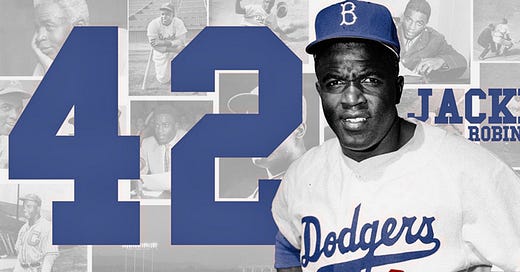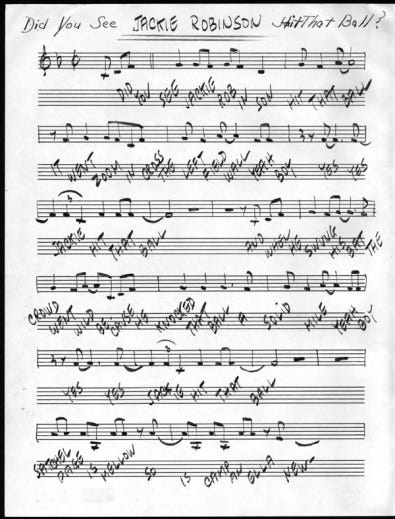78 + 45 + 33⅓ = 42: The Legacy Of Music Inspired By Baseball Legend Jackie Robinson
The groundbreaking #42's diamond career was all about records; it's fitting, then, that artists across genres have memorialized the MLB great with even more records...of the vinyl kind.
Jackie Robinson was born on January 31, 1919, which means that, in 2022, we’ll be celebrating the 103rd anniversary of his birth. In 2019, on his 100th birthday, Major League Baseball began its year-long celebration of the Hall of Fame legend, who famously broke down baseball’s color barrier.
Robinson was posthumously conferred the Key to Brooklyn at a special ceremony, with the key presented to his family by Brooklyn Borough President Eric Adams, currently the New York City mayor.
Among other ceremonies, Robinson’s wife, Rachel, and his daughter, Sharon, joined MLB Commissioner Rob Manfred at the opening of an “In the Dugout with Jackie Robinson” exhibit at the Museum of the City of New York.
The showing featured more than two dozen images of Robinson and the Brooklyn Dodgers taken for Look magazine, many never before seen. In case you missed it:
The 19,380-square-foot Jackie Robinson Museum in New York City is slated to open in spring 2022:
Jackie Robinson Sets Baseball on Its Ear
Understandably, Robinson’s legacy has traveled far and wide. The worlds of art and theatre have been joined by literature and Hollywood films in tipping their collective caps in his direction.
Robinson’s courage, dignity, and fortitude influenced several generations of baseball players from every conceivable background and birth country.
Lesser known, perhaps, might be the indelible mark Robinson made on music and its composers and lyricists. Especially rife for foraging is the treasure trove of songs written and recorded in the last half of the 20th century (and beyond), all produced with the respect and appreciation of Robinson’s diamond exploits embedded lovingly in their grooves.
Robinson’s “Hit Records” That Aren’t In Cooperstown
Two years after the segregation landmark etched by the Cairo, Georgia native, singer Buddy Johnson and legendary jazz giant Count Basie recorded 1949’s rollicking “Did You See Jackie Robinson Hit That Ball?” on Decca Records. In August of its release year, it peaked at #13 on Billboard‘s charts.
“Jackie is a real gone guy,” concludes the song’s writer, Johnson, in a song that also joyously name-drops fellow stars Satchel Paige and Larry Doby, as well as Robinson’s Brooklyn Dodgers teammates of the time, Roy Campanella and Don Newcombe.
Two months before Johnson’s record, though, Basie actually released a 78 RPM record on RCA Victor with this arrangement, featuring “Taps” Miller on vocals. Of the two, fans are probably more familiar with this version:
For a bit of sonic contrast, here’s Natalie Cole’s arrangement from 1994 on Elektra Records, featured in Ken Burns’ highly-regarded Baseball film documentary:
Photos are plentiful, from 1954, of Natalie’s father, Nat “King” Cole, posing with Jackie Robinson at Chicago’s Wrigley Field when she was just four years old.
2012 saw the release of this racially optimistic “Jackie Robinson” story song by Everclear from their Invisible Stars album:
In a gentle children’s recording, folk-pop singer/guitarist and children’s book author Ellis Paul offers this biographical tune, “Jackie Robinson,” from his The Hero in You album, his 17th:
Tune + Tune = “42”: Mark Isham, Scoring From Home
2013’s well-received “42” theatrical biopic, written and directed by Brian Helgeland, featured a stirring and majestic soundtrack, composed by Mark Isham. A taste:
“‘There was a sense of real responsibility to do a good job on this,’ Isham told MPAA.org in April 2013. Everyone involved in the film was committed to honoring the late, great Robinson.
“With his widow, Rachel (played in the film by Nicole Beharie), still herself a powerhouse [at 99], there was added pressure to get it right and honor her as well. This, of course, is to say nothing of actor Chadwick Boseman’s responsibility playing the man himself.”
Isham: “I wrote most of the main themes of this film at the piano. In a case like this, where I’m writing more of a traditional film score, I like to grab a piece of paper and pencil and get out of the electronic world and sit at the piano for a number of days.
“We do want a traditional Hollywood score, orchestral, and we’re not going to try to be clever and modernize it, it’s going to be in the grand tradition of Hollywood scoring. Epic. Because it is an epic story.”






